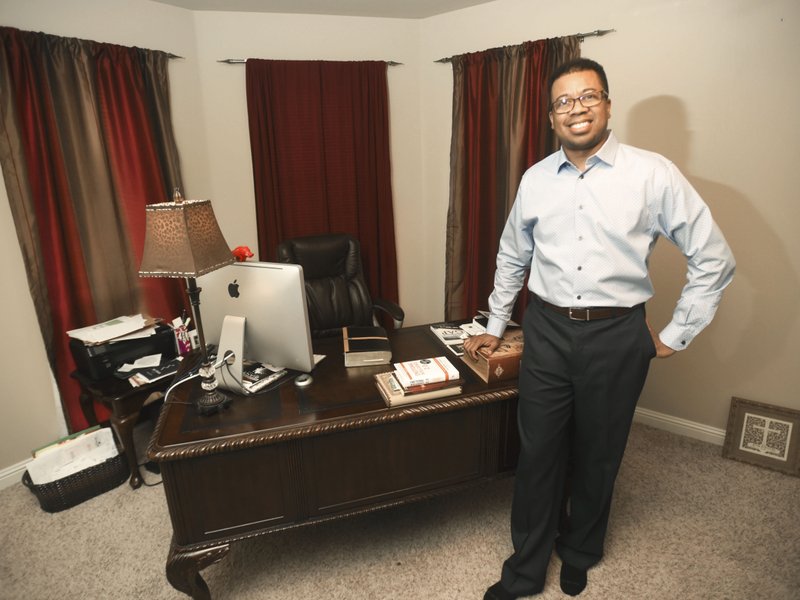BENTONVILLE -- Some Northwest Arkansas Community College administrators took breaks from their duties last semester to see the school from a student's perspective.
Todd Kitchen, vice president of student services, spent the first few weeks of the semester as an "undercover" administrator in Megan Bolinder's college reading course. He dressed down and wore a ball cap to class to blend in.
Enrollment Support
Northwest Arkansas Community College plans to open an Enrollment Support Center on Feb. 13. The center will be staffed by six people who are cross trained in various aspects of enrollment and student concerns, including the application process, financial aid and student records. The goal is to provide a more user-friendly environment that minimizes complications and confusion, according to Todd Kitchen, vice president of student services.
Source: Staff report
"I was probably able to attend the first four weeks on a fairly consistent basis until some other commitments took me away, so I withdrew from the class," Kitchen said.
Before that, however, Kitchen gained some valuable insight to a student's life.
"I was surprised at the amount of work these students manage," he said. "Although that was a developmental course, the rigor, the expectations, they were real. They were challenging, but not overwhelming."
Tim McGinn, an associate professor of composition, creative writing and literature and Faculty Senate president, suggested this idea of experiencing life in the classroom during a meeting of President Evelyn Jorgenson's cabinet last summer.
McGinn was inspired by a story from The Chronicle of Higher Education about Mike Cross, a community college professor in Massachusetts who earned an associate degree at his school last year despite already having a doctorate in organic chemistry.
Cross was motivated mainly by a desire to better understand how his students juggled their school, work and personal lives, according to the article.
"He said he wanted to have more empathy for the students," McGinn said.
None of the Northwest Arkansas Community College administrators did anything like what Cross did, but getting into the classroom was nevertheless a worthwhile exercise, he said.
McGinn, now in his 22nd year at the college, attended Barbara Mark's reading class for a while last semester. He got into conversations with students he otherwise wouldn't have, he said.
"They end up talking about gas money, other kinds of things that if you're sitting next to them you hear, versus if you're standing at the front of the room," McGinn said.
The administrators participated mostly in developmental classes -- also known as remedial classes -- for a reason. Colleges are run by overachievers who never had to experience those kinds of classes, he said.
"You don't know what it's like until you put yourself in those shoes. I thought it was important for us to experience what we never did in our own education system," McGinn said.
Ricky Tompkins, vice president of learning, sat in on an English class, a math class and a music appreciation class as a student. One day he even taught a few sessions of sociology. Tompkins formerly taught sociology at Henderson State University.
"It was a good experience. It's always nice to look at things from the student perspective and the faculty perspective," Tompkins said.
Evelyn Jorgenson, college president, got involved in a reading class. She came away impressed with the quality of instruction and students' engagement level, according to a statement from the college.
Bolinder, dean of the Communications and Arts Division, said having Kitchen in her class was a bit nerve-wracking, admitting she lost some sleep the night before each of those classes.
"But it was fun. It was like being a new teacher again," she said. "It was a really good reminder that we should treat every interaction with students as if they were cabinet members. I should always prepare as if a cabinet member is going to be there."
Kitchen's presence wasn't a distraction, Bolinder said. She said one of the other students knew him from having run into him elsewhere on campus.
"The beauty of a community college is that a classroom never looks the same demographically or otherwise. So it's not unusual to have multiple ages and multiple life experiences in the classroom," she said.
Kitchen, besides getting into the classroom, also went through the same process students go through to register for classes. Kitchen is looking at ways to streamline the registration process to make it easier for students. That includes trimming the admission application.
Jim Hall, the college's director of government and community relations, and his wife, Diane, audited Jami Forrester's Arkansas history course last semester. State Rep. Jana Della Rosa, R-Rogers, audited the same class with them.
The class of 18 students met Tuesday and Thursday during the lunch hour.
"In my job, there are times I need to know a little about Arkansas history," said Hall, adding he was drawn to Forrester's class because of her reputation as a teacher.
Hall said he knew a lot of the history initially being discussed and was answering a lot more questions than other students were. That prompted Forrester early in the semester to take a moment to explain who Hall was.
"She had to stop class and say, 'Time for full disclosure,'" he said.
Hall hadn't spent any significant time in a classroom since he graduated from John Brown University in 1994. He admits he fell behind in the class because of work-related obligations.
"If I underestimated anything, it was the amount of time preparing for each class," Hall said. "It seems like there was a lot more preparation time for this class than some of my other classes 30 years ago."
NW News on 02/02/2017
